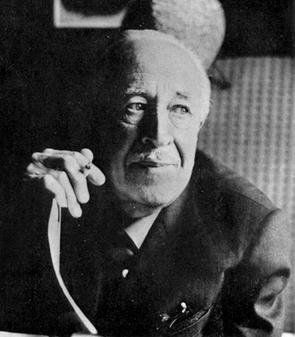A list of films produced in the Soviet Union in 1969 (see 1969 in film).
A list of films produced in the Soviet Union in 1969 (see 1969 in film).

The cinema of the Soviet Union includes films produced by the constituent republics of the Soviet Union reflecting elements of their pre-Soviet culture, language and history, albeit they were all regulated by the central government in Moscow. Most prolific in their republican films, after the Russian Soviet Federative Socialist Republic, were Armenia, Azerbaijan, Georgia, Ukraine, and, to a lesser degree, Lithuania, Belarus and Moldavia. At the same time, the nation's film industry, which was fully nationalized throughout most of the country's history, was guided by philosophies and laws propounded by the monopoly Soviet Communist Party which introduced a new view on the cinema, socialist realism, which was different from the one before or after the existence of the Soviet Union.

Lev Vladimirovich Kuleshov was a Russian and Soviet filmmaker and film theorist, one of the founders of the world's first film school, the Moscow Film School. He was given the title People's Artist of the RSFSR in 1969. He was intimately involved in development of the style of film making known as Soviet montage, especially its psychological underpinning, including the use of editing and the cut to influence the emotions of audience, a principle known as the Kuleshov effect. He also developed the theory of creative geography, which is the use of the action around a cut to connect otherwise disparate settings into a cohesive narrative.

Soyuz 4 was launched on 14 January 1969, carrying cosmonaut Vladimir Shatalov on his first flight. The aim of the mission was to dock with Soyuz 5, transfer two crew members from that spacecraft, and return to Earth. The previous Soyuz flight was also a docking attempt but failed for various reasons.

Topaz is a 1969 American espionage thriller film directed by Alfred Hitchcock. Based on the 1967 novel of the same title by Leon Uris, the film is about a French intelligence agent (Stafford) who becomes entangled in Cold War politics before the 1962 Cuban Missile Crisis and then the breakup of an international Soviet spy ring.

Mosfilm is a film studio which is among the largest and oldest in the Russian Federation and in Europe. Founded in 1924 in the USSR as a production unit of that nation's film monopoly, its output includes most of the more widely acclaimed Soviet-era films, ranging from works by Andrei Tarkovsky and Sergei Eisenstein, to Red Westerns, to the Akira Kurosawa co-production Dersu Uzala and War and Peace.

The Sino-Soviet border conflict was a seven-month undeclared military conflict between the Soviet Union and China in 1969, following the Sino-Soviet split. The most serious border clash, which brought the world's two largest communist states to the brink of war, occurred near Damansky (Zhenbao) Island on the Ussuri (Wusuli) River in Manchuria. Clashes also took place in Xinjiang.

Chinghiz Torekulovich Aitmatov was a Kyrgyz author who wrote mainly in Russian, but also in Kyrgyz. He is one of the best known figures in Kyrgyzstan's literature.

Sergei Parajanov was an Armenian film director and screenwriter. Parajanov is regarded by film critics, film historians and filmmakers to be one of the greatest and most influential filmmakers in cinema history.

War and Peace is a 1966–1967 Soviet epic war drama film co-written and directed by Sergei Bondarchuk, adapted from Leo Tolstoy's 1869 novel. Released in four installments throughout 1966 and 1967, the film starred Bondarchuk in the leading role of Pierre Bezukhov, alongside Vyacheslav Tikhonov and Ludmila Savelyeva, who depicted Prince Andrei Bolkonsky and Natasha Rostova.

Sergei Appolinarievich Gerasimov was a Soviet film director and screenwriter. The oldest film school in the world, the Gerasimov Institute of Cinematography (VGIK), bears his name.

Mikhail Konstantinovich Kalatozov, born Mikheil Kalatozishvili, was a Soviet film director of Georgian origin who contributed to both Georgian and Russian cinema. He is most well known for his films The Cranes Are Flying and I Am Cuba. In 1969, he was named a People's Artist of the USSR. His film The Cranes Are Flying won the Palme d'Or at the 1958 Cannes Film Festival.

Cinema of Estonia is the film industry of the Republic of Estonia. The motion pictures have won international awards and each year new Estonian films are seen at film festivals around the globe.
CBS Children's Film Festival is a 1967–1984 television series of live action films from several countries that were made for children. Originally a sporadic series airing on Saturday mornings, Sunday afternoons, or weekday afternoons beginning in February 1967, it became a regularly scheduled program in 1971 on the CBS Saturday-morning lineup, running one hour with some films apparently edited down to fit the time slot. The program was hosted by 1950s television act Kukla, Fran and Ollie, a.k.a. puppeteer Burr Tillstrom and actress Fran Allison.
These are lists of films produced in the Soviet Union between 1917 and 1991. Films are listed by year of release in alphabetical order on separate pages.
Tallinnfilm is the oldest surviving film studio in Estonia. It was founded as Estonian Culture Film in 1931, and was nationalized in 1940 after Estonia was integrated into the Soviet Union. During the first year of Soviet Occupation (1940–1941) Eesti Kultuurfilm was taken over by the Communist Party and renamed Kinokroonika Eesti Stuudio. In 1942 during the German occupation the studio was renamed Kinokroonika Tallinna Stuudio and then renamed again as Tallinna Kinostuudio in 1947 by the Soviets. The Tallinn Film Studio was renamed Kunstiliste ja Kroonikafilmide Tallinna Kinostuudio in 1954 and in 1963 was renamed again Tallinnfilm.

Sergei Alexandrovich Solovyov was a Soviet and Russian film director, producer, screenwriter, and actor. In 1993 he was awarded the People's Artist of Russia title.

The Brothers Karamazov is a 1969 Soviet film directed by Kirill Lavrov, Ivan Pyryev and Mikhail Ulyanov. It is based on the 1880 novel by the famous Russian author Fyodor Dostoevsky. It was nominated for the Academy Award for Best Foreign Language Film. It was also entered into the 6th Moscow International Film Festival, winning Pyryev a Special Prize.

Ivan Aleksandrovich Pyryev was a Soviet and Russian film director, screenwriter, actor and pedagogue remembered as the high priest of Stalinist cinema. He was awarded six Stalin Prizes, served as Director of the Mosfilm studios (1954–57) and was, for a time, the most influential man in the Soviet motion picture industry.

Scarlet Days is a 1919 American silent Western film produced and directed by D. W. Griffith and released through Paramount/Artcraft Pictures, Artcraft being an affiliate of Paramount. Richard Barthelmess stars in a role for which Griffith had screentested Rudolph Valentino. In today's time, this film is considered by many to be one of Griffith's worst films though it might have worked better as a short film. This film was unlike others created by D.W. Griffith. According to an article written for The Cincinnati Enquirer, written on the 16 of November 1919: "Unlike other recent Griffith production, Scarlet Days is a story of the old West, of the gold rush days of 49- Bret Harte transferred to the screen!" The Western film genre was expanding at this time and Scarlet Days fits into this category. Western films were popular for this time.